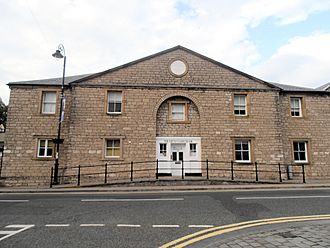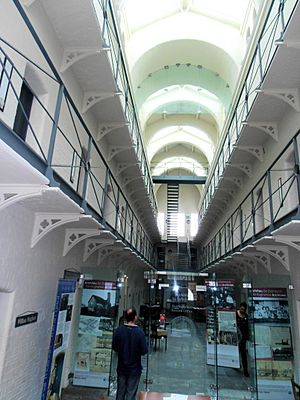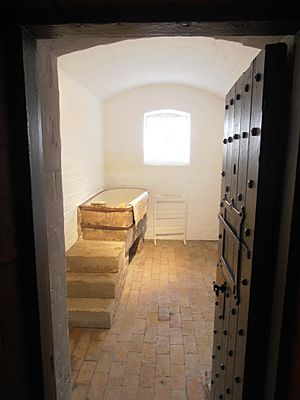Ruthin Gaol facts for kids
Quick facts for kids Ruthin Gaol |
|
|---|---|

Carchar Rhuthun, Ruthin
|
|
| General information | |
| Town or city | Ruthin, Denbighshire |
| Country | Wales |
| Coordinates | 53°06′59″N 3°18′37″W / 53.116474°N 3.310352°W |
| Construction started | 1654 |
| Completed | 1654 |
| Technical details | |
| Structural system | stone |
Ruthin Gaol (which means Carchar Rhuthun in Welsh) is a historic building in Ruthin, Denbighshire, Wales. It was once a prison designed in a style similar to London's Pentonville Prison. Today, it's a fascinating museum where you can learn about its past.
Ruthin Gaol stopped being a prison in 1916. At that time, all the people held there and the staff moved to Shrewsbury Prison. Later, in 1926, the local council bought the buildings. They used parts of the old prison for offices, to store important historical documents, and as the town's library.
During the Second World War, the prison buildings had a very different role. They were used as a factory to make supplies for the war effort. After the war, the buildings went back to the council. For a while, they served as the main office for the Denbighshire Library Service. Then, in 2004, the gaol was carefully restored and opened its doors as a museum.
Contents
Exploring Ruthin Gaol's Past
The First Prison Building
The very first building used as a house of correction in Ruthin was built in 1654. It was located near the river on Clwyd Street. This early prison replaced an even older building called the Old Court House. It was a place where people who didn't have jobs were sent to work.
Building a New Model Prison
Later, a famous prison reformer named John Howard looked into how prisons were run. Because of his work, the local officials in Denbighshire decided to build a new, improved prison in Ruthin. Construction started in January 1775 on the same spot as the old house of correction.
By 1802, this new prison had four cells for people who had committed crimes and nine rooms for people who owed money. As time went on, the prison grew. By 1837, it could hold up to 37 people.
A Modern Prison for Its Time
In 1865, a new law called the Prison Act 1865 set higher standards for how prisons should be designed. The existing Ruthin County Gaol didn't meet these new rules. So, plans were made to build a brand new, much larger wing.
This new prison was designed to hold up to 100 people. It was built in the style of London's famous Pentonville Prison. The construction cost about £12,000, which was a lot of money back then! On April 1, 1878, the Ruthin County Gaol officially became HM Prison Ruthin. It served the counties of Denbighshire, Flintshire, and Merionethshire.
See Also
- The Old Court House
- The Morning Star, Ruthin
 | Kyle Baker |
 | Joseph Yoakum |
 | Laura Wheeler Waring |
 | Henry Ossawa Tanner |



